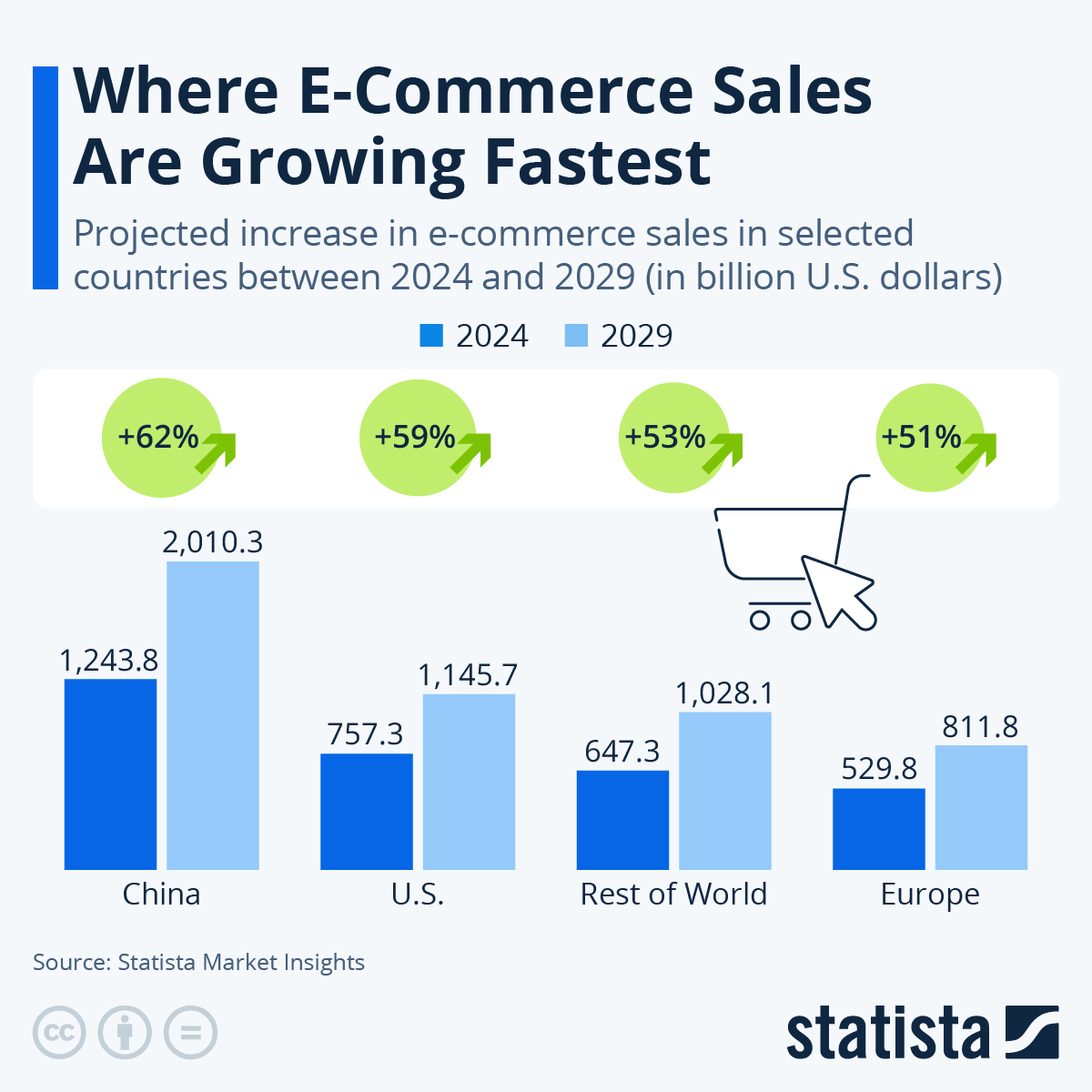5 Reasons Why Companies Go Global

By Congli Huang
Entering international markets has long been considered a strategic move for many thriving businesses and organizations.
In today’s highly digital world, going global is slowly becoming less of an optional strategy and more of an expected or highly awaited maneuver. In the coming years, we can expect international expansion to be the norm.
Thanks to advances in technology and the rise of e-commerce, it has become more feasible to expand operations in new markets. Even smaller or niche businesses can reach new customers in foreign countries and achieve new successes.
However, many companies still have second thoughts about going global. After all, the path to international expansion requires facing new challenges to start over in a new country and new market.
For businesses and organizations serious about their continued growth, though, entering foreign markets should be a natural next step.
Why and How to Expand Business Internationally
Growth-minded businesses aim to someday expand internationally. They do not see international expansion as an end goal, but rather as the start of a challenging new venture.
Entering overseas markets presents new customers, new revenue streams, and new competitors. However, in order to fully take advantage of these new opportunities, it is crucial to figure out the “why” before answering the “how.”
Having a clear objective makes it easier to figure out how to expand your company internationally and gauge how well it is proceeding.
A company’s reason for expansion drives its business goals and aids in structuring its foreign expansion strategy. Clear purposes for international expansion also help businesses set key performance indicators and metrics of success.
Related Read: Factors to Consider When Entering a New Market
What Are the Benefits of Expanding Into Global Markets?
Expanding a business internationally offers many benefits when done properly. Businesses that are preparing for a potential international expansion should take the time to explore which benefits they are aiming to achieve.
For businesses and organizations still undecided about entering foreign markets, here are five compelling reasons why companies go global.
1. Lower Your Competition in Growing Markets
Gaining a competitive advantage over current business competitors is one of the biggest reasons to expand internationally.

Businesses and organizations that initiate global expansion often do so to gain a first-mover advantage. The move allows them to leave a saturated domestic market and find new customers in developing markets.
Moreover, entering new markets gives businesses greater visibility. This allows their company to build strong brand awareness and a connection with local consumers. Even when their domestic competitors do enter the market, they have the advantage of having a more recognizable brand name.
Lowering your competition does not only apply to customers or consumers but also to suppliers. An international expansion can also help your company find better suppliers and access new technologies that may boost business operations. This can be one of the most popular reasons why companies go global.
2. Offset Fluctuations in Your Local Market
Global expansions and a diversified market presence offer your company a way to mitigate long-term risks from the effects of a fluctuating local and global market.
Triumphantly entering new markets overseas allows companies to decrease their dependency on their local market. Instead of feeling the brunt of one market’s highs and lows, companies can use the profitable operations of one market to offset the negative performance of another.
Another reason why companies go global is so that they can take advantage of foreign markets to introduce unique products and services based on local palates. A poorly performing product in domestic markets may also be offset by introducing it in another country where customer preferences indicate a better reception.
3. Improve Your Margins
Going global gives businesses access to new talent pools and new technology. These may help bring down production or operational costs, allowing companies to improve their profit margins.
Moving divisions to foreign countries is not a new concept. China, India, and other Asian countries have gained a reputation for being economical production places.
More affordable talent, material, and labor costs allow businesses to keep manufacturing costs down while still ensuring quality products and business performance.

Entering a new market also allows you to prolong the sales life of an existing product or service. In particular, products that are on a decline locally due to market saturation may be positively received abroad.
Instead of spending time and money on new product development, companies can create a new revenue source by finding new consumers for a previously successful product.
4. Jump on a Unique Opportunity
Sudden changes within the management, the industry, or the local market are ideal openings for expanding internationally. Mergers, acquisitions, and new office locations, in particular, are opportunities you can capitalize on to move forward internationally.

Infographic courtesy of Statista.
Unexpected events also create unique opportunities for global expansion. A prime example is how businesses and consumers across the world increasingly went digital when the pandemic hit.
Experts at UNCTAD noted a three-percentage point increase in e-commerce retail sales to 19% in 2020. There has been a surge in e-commerce transactions and contactless payments as consumers move to shopping online instead of in person.
Consumers no longer limit themselves to what is locally available. Rather, they are exploring overseas retailers and rewarding businesses that responded to the increased demand for global payments support.
5. Respond to Demand
One of the most common and most telling reasons why companies go global is the existence of measurable demand.
Companies that do not expand their operations to international markets after seeing significant demand for their products and services miss out on highly lucrative opportunities.
It is increasingly easier to see how foreign markets respond to products, even ones that are not yet available to them, thanks to the internet. When you see international consumers showing interest in your goods, it is highly advised to try testing the market through a small expansion.
This way, companies can tentatively enter international markets while keeping risks low, but at the same time have the leeway to scale up operations if the reception is favorable.
5 Factors to Consider When Expanding Your Business Internationally

Expanding your business internationally requires much time, effort, and commitment to ensure the process goes smoothly. Having a foreign expansion strategy is paramount when establishing your presence at an international level.
A foreign expansion strategy or business plan answers the question of how to expand business internationally.
A sound set of foreign expansion strategies gives your business the structure it needs to become sustainable in a new market. It allows you to create a business model that would work in the country you are entering.
Moreover, a foreign expansion strategy accounts for the different factors that may prove challenging for growing your business.
The factors you need to address in an overseas business plan include the following:
1. Regulation and Compliance
Businesses and organizations need to have a thorough understanding of the regulations and laws in the country they are trying to enter. Unnecessary and avoidable compliance issues can greatly slow down a company’s expansion. It may also negatively affect public perception.
Some regulatory proceedings and legal requirements you need to plan for are:
• Opening local bank accounts
• Registering tax requirements
• Getting necessary health and safety certifications
• Maintaining financial and corporate records
• Renting or buying commercial property
2. Operations
Smooth business operations rely on your chosen business model. You will need to adapt your current business model to incorporate your expansion strategy and work in a new foreign market.
Having a functional infrastructure is also necessary for effective and efficient business operations. Your company will also need to arrange local employee divisions to handle different departments, such as human resources, payroll, accounting, and legal counsel.
3. Foreign Market Research
Understanding why companies go global is one thing. But actually going global is another. It’s a major decision. As such, you need to make sure the foreign market you plan to enter is truly the optimal choice for your business and your products or services. Researching Google Trends, interviewing industry experts, and looking at stable economics are important when doing foreign market research.
Additionally, conducting a market analysis is essential before diving into a foreign market. You need to know who your consumers are, their preferences, potential local competitors, necessary taxes or regulations, and more.
Related Read: Everything You Need to Know About the eCommerce Market in China
4. Product Distribution
Any company’s foreign expansion strategy should outline the product or service distribution. You need to remain in control of your sales process to ensure a smooth delivery of goods to your new customers.
You need to figure out which type of distribution strategy would work best in an international market.
A well-constructed distribution strategy will allow your business to reach the maximum potential customers while maintaining distribution costs at a minimum. If your product distribution strategy is not properly thought through, it may lead to losses and market expansion failure.
Related Read: How to Collect Payments from International Suppliers
5. Payment Methods
When expanding internationally, it is imperative to allow global payments. Among two companies that expanded internationally at the same time, the one with a seamless payment system holds the competitive advantage.
Your business can attract more consumers by providing an easy and accessible way to pay. More so if your payment system allows customers to pay using their local currencies. This lessens the hassle of opening a foreign currency account and converting currencies themselves.
Moreover, providing an option for mobile payment transactions or integrating with a widespread local mobile payment system can help increase consumers’ willingness to buy your product.
Related Read: 5 Best Ways to Receive International Payments

For example, a large, global etailer had a significant number of cross-border shoppers from the Asia-Pacific region. However, compared to their domestic business, the company faced challenges with these international customers and lost revenue, realizing an online shopping cart abandonment rate of 70% for first-time Asia-Pacific buyers, low card approval rates of approximately 50%, and above average fraud rates with cross-border payments.
A major obstacle that contributed to the lost business opportunities was the limited payment options offered at checkout. For Asia-Pacific consumers, using credit cards is not their preferred payment method. In fact, less than 10% of online transactions are credit-card based in the fast-growing Asia-Pacific region. These online buyers are accustomed to using digital wallets rather than credit cards.
Since the etailer didn’t have the technology to offer mobile wallet capabilities, they needed a solution. The goal was to improve online shopping cart conversion rates by better serving their Asia-Pacific customers and supporting their buying habits. The company reached out to Citcon, the leading provider of mobile payment solutions.
By partnering with Citcon, the global etailer saw significant improvements in online conversion. The business improved the shopping and checkout process for their Asia-Pacific consumers and boosted top-line growth, reducing its online shopping cart abandonment rate by almost 50%, increasing its overall card approval rate to 85%, and experiencing zero chargeback fraud for wallet-related payments.
Related Read: 5 Advantages of Expanding a Business Internationally
Why Companies Go Global With Help from Citcon
Citcon is an all-in-one payment platform that integrates with over a hundred digital wallets worldwide. We offer in-store, online, and mobile payment solutions. Several of our clients are well-known names in the retail and hospitality industries.
Learn more about how Citcon’s global payment processing solutions can help you expand your business internationally and gain a competitive advantage.
Sign up now to request a demonstration of our all-in-one platform. We tailor our demonstrations for each potential client, ensuring you get a clear insight into why companies go global with help from Citcon and how we can enhance your business operations.
Click here to fill in a demo request form or call us at +1-888-254-4887.
Schedule your commitment-free Citcon demo today!

